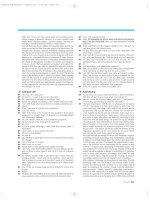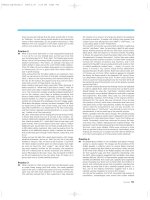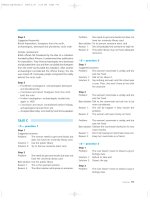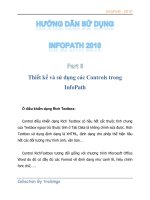Tài liệu A resource for reading and words part 6 doc
Bạn đang xem bản rút gọn của tài liệu. Xem và tải ngay bản đầy đủ của tài liệu tại đây (206.01 KB, 15 trang )
READING COMPREHENSION
1. We can infer from the passage that every act
A) has to mean something.
B)
sends a message.
C) is a signal
D)
should be seen.
E) is not a gesture.
2. Gestures are done either on purpose or
A) to signal something.
B) cautiously.
C) by chance.
D) by somebody else.
E) meaningfully.
3. Hand waving has no other purpose than
A) to give information to others
B) sneezing
C)
to go on communication
D)
to finish a communication
E) setting out.
PASSAGE 39
SOCIAL NORMS
Social order is contingent upon most individuals doing what
is expected of them by others. Yet we are generally fascinated
by the people who do not comply with the rules. Generally
we call these people deviants. By definition, deviants are
people who violate group norms and we tend most often to
think of criminals as the mentally ill people. But deviance can
also describe acts that are more industrious, more ambitious
or more honest than that generally expected within the social
system.
VOCABULARY
> DEFINITIONS
Order: Harmony
To be contingent upon: To be dependent upon
To fascinate: To charm
To comply with: To obey
Deviant: Abnormal, unusual
To violate: To break
To tend: To be inclined
Mentally: Psychologically
Industrious: Hardworking
Ambitious: Determined
>
EXERCISES
Complete the sentences with a suitable, form of the .words
defined above
1. Waiting in one area is activity in others.
2. I ensured that Construction work the relevant building
regulations.
3. In other words, for an action to be it has to cause some
form of critical reaction and disapproval from others in the
particular society.
4. The islanders are ; they are either out at work or
working at home.
5. They tend to be young, energetic, and , but so they are
likely to realize their goals.
READING COMPREHENSION
1, The writer points out that social order cannot be maintained if
individuals
A)
depend on others in the society.
B) do what most people do.
C) do not conform to generally accepted rules,
D) expect others to do what they do.
E) are not fascinated by those breaking the rules.
2, People who commit crimes are
A) not certainly deviants.
B)
generally expected to be honest.
C) in agreement with group norms.
D) not really mentally ill.
E)
thought to be suffering an illness of the mind.
3. We can infer that the word "deviance"
A)
is only associated with evil things.
B)
is exclusively'Used for ambitious people,
C)
means people rejected by the social system.
D) does not only Bring bad qualities to mind.
E) has no other meaning but honest.
PASSAGE 40
MAN'S BRAIN '
The amazing success of man as a species is the result of the
evolutionary development of his brain which has led, among
other things, to tool-using, tool-making, the ability to solve
problems by logical reasoning, thoughtful cooperation, and
language. One of the most striking ways in which the
chimpanzee biologically resembles man lies in the structure
of his brain. The brain of the modern chimpanzee is probably
not too dissimilar to the brain that so many millions of years
ago directed the behavior of the first ape-man.
VOCABULARY
Evolutionary : Related to gradual, natural development
To led to : To cause
Logical: Reasonable
To reason: To exercise the power of thought
Thoughtful : Considerate, kind
Cooperation: Teamwork
Striking: Remarkable, outstanding
To resemble :To look like
To lie in : To exist
Dissimilar to: Different from
To direct: To manage, To control
EXEKCISES
Complete the sentences with a suitable form of the words
defined above
1. Lunchtime drinking that ;.,. reduced or poor quality work
in the afternoons is one example.
2. Their flowers appear over several weeks in summer and
are at all times most and handsome.
3. The real power of computerised data a deeper, more
sophisticated analysis of the information which already
exists.
4. Photographs and recollections confirm that in features and
colouring he his mother.
5. In this respect, the study of the properties of objects in the
social sciences is quite to equivalent studies in physics
or chemistry.
READING COMPREHENSION
1. The fact that prehistoric man made tools is considered to be one
of the major criteria
A) which do not make him more intelligent.
B) peculiar to animals.
C) distinguishing him from other creatures.
D) playing an important part in the security of chimpanzees.
E) proving that chimpanzees are unique.
2. The brain structure of the chimpanzee
A) is probably like that of early man.
B) is biologically dissimilar to man's brain.
C) does not resemble man's brain.
D) enables it to solve quite complex problems.
E) is more complex that those of the other animals.
3. The chimpanzee
A) gestures are very different from human gestures
B) directed the behavior of the early man
C) can solve problems by logical reasoning
D) and man show dissimilarities in behavior
E) is similar to man in several ways
PASSAGE 41
BLINDNESS
A blind baby is doubly handicapped. Not only is it unable to
see, but also, because it cannot receive the visual stimulus
from its environment that a sighted child does, it is likely to
be slow in intellectual development. Now the ten-month-old
son of Dr. and Mrs. Denis is the subject of an unusual
psychological experiment designed to prevent a lag in the
learning process.
VOCABULARY
>- DEFINITIONS
Doubly: Twice as
Handicapped: Suffering from a physiological or mental
disability
Stimulus: Motivation, incentive
Sighted: Able to see
Intellectual: Interested in things of the mind
Subject: Person, animal or thing to undergo or experience
something
To design: To plan
Lag: Delay
> EXERCISES
Complete the sentences with a suitable form of the words
defined above
1. The name is called twice now, for the matter is urgent.
2. At the back of the hall a woman sat quietly in a
wheelchair and a man paced up and down, a tiny Down's
syndome baby gurgling in his arms.
3. This money was initially paid out to distributors as a to
set up a network of satellite producers.
4. Magnifiers are available for partially people.
5. It just doesn't pay behind the hitech revolution Technology.
READING COMPREHENSION
1. Failing to receive visual stimulus
A)
disables the child to see
B)
is an advantage for a blind child.
C)
slown down the learning process.
D)
the environment does not show.
E)
makes the blind cleverer.
2. The things a child sees in his surroundings.
A) can help him identify the objects behind.
B) don't mean much to him.
C) make him doubly handicapped.
• D) make the child an ideal subject for testing.
E) are helpful to intellectual development.
3. From the passage we understand that
A)
Denis is blind from birth.
B)
a blind child's mental development is slower than his physical
development
C)
blind people face countless difficulties in their lives'
D)
the blind can live near-normal lives when compared with
other handicapped people
E)
-sighted people can not locate objects as well as the blind.
PASSAGE 42
COLLEGES
The ultimate defense of college has always been that while it
may not teach you anything vocationally useful, it will
somehow make you a better person, able to do anything
better, and those who make it through the process are
initiated into the 'Fellowship of educated men and woman."
In a study intended to probe what graduates seven years out
of college thought their colleges should have done for them,
the Carnegie Commission found that most alumni expected
the "development of my abilities to think and express
myself."
VOCABULARY
>
DEFINITIONS
Ultimate : Final, eventual
Defense: Guard, security
Vocationally : Related to a certain kind of work
To initiate: To start
To probet To investigate.
Alumni: Former students, graduates
> EXERCISES
Complete the sentences with a suitable form of the words
defined above
1. Being able to land safely in fields should be one of the
aims in glider pilot.
2. Each of these courses is attractive, academically
challenging and personally fulfilling.
3. The autumn launch of the Campaign for Resource will
include a wide range of events to which we welcome
friends, , students and staff.
4. I was usually the active person, or rather it was usually I
who discussions.
5. A lengthy public enquiry the cause of the disaster and
attributed blame to certain officials, but blame is not a
necessary part of this story.
READING COMPREHENSION
1. We can infer from the passage that
A)
every student long for a college education
B)
colleges are the only places where students can do something
good
C)
nobody criticizes colleges
D) college graduates should defend colleges
E)
some people are against colleges
2. According to the author college education.
A) help people find useful jobs
B) provide students with full knowledge about vocations
C) do not help the students enough to specialize in a profession
D) will not make one a better person
E) gives everything that a person needs
3. It is obvious from the passage that.
A) colleges help students to express themselves
B) colleges didn't develop students' abilities to think
C) study investigated the effect of seven years oh the students
D) students were happy because they attended the college
E) Carnegie Commission was made up of students
PASSAGE 43
SLEEP
Some scientists have asserted that there is a correlation
between your intelligence and the amount of sleep you need.
The higher your intelligence, the less sleep you need.
Intelligence reaches its peak in the early twenties and most
great scientific discoveries have been made by under thirties.
It has been indicated that the two best ways to maintain your
intelligence at its youthful strength are to drink no alcohol
and to continue studying throughout your life.
VOCABULARY
To assert: To claim
Correlation: Link, association
Peak: Highest point, top
To indicate: To show
To maintain: To keep
Youthful: Young, fresh
Strength: Power
Throughout: During, the whole time
EXERCISES
Complete the sentences with a suitable form of. the words
defined above.
1. Linda Cullen that her first book willnot.be her last and
adds that the next one is on the way.
2. Using data from 1,000 1988. annual reports, the survey
found a close between industry performance and pay
increases.
3. In my view, at the of his career, my father achieved his
ambition,
4. Thousands of boats were constructed and in the
hundreds of boatyards or "docks" found on Britain's canals
and rivers.
5. Returning to the kitchen, she with a nod of her head
that Craig sit on the stool near the fire.
READING COMPREHENSION
1. It has been suggested in the passage that
A)
intelligent people need no sleep at all
B)
there is no connection between intelligence and sleep
C) less intelligenf people need less sleep
D) although it is not certain intelligent people need less sleep
E) it has been proved that intelligent people need more sleep
2, Most scientific discoveries were made
A)
by a very small group of people
B)
by people who have drunk very little alcohol
C)
in the first part of the century
D)
by young people
. .
E)
by older people
3. You can stop your intelligence deteriorating if you
A)
rarely drink
B)
go to university
C)
always try to keep learning ,
D) never drink when you are studying
E) drink and study throughout your life
PASSAGE 44
EYE CONTACT
The eyes themselves can convey several kinds of messages.
Meeting someone's glance with your eyes is usually a sign of
involvement, while looking away signals a desire to avoid
contact. Most of us remember trying to avoid a question we
didn't understand by glancing away from the teacher. At
times like these we usually become very interested in our
textbooks, fingernails, the clock- anything but the teacher's
stare. Of course, the teacher always seemed to know the
meaning of this nonverbal behavior and ended up picking on
those of us who signaled out uncertainty.
VOCABULARY
>
OEFlWlTTcDNJS
To convey: To send
Glance: Quick look
Involvement: Taking part, concern, interest
To avoid: To keep away from, to evade
To signal: To show, to indicate
Stare: Intent look, gaze
Nonverbal:
To end up: To finish up
To pick on: To choose, to decide on
. Uncertainty; Hesitation, doubt
>
EXERCISES
Complete the sentences with a suitable form of the words
defined above. .
1. I'm not going to you so you can feel free to answer the
question.
2. Moments of doubt and always arise, even with the
greatest people.
3. He spent ages at the window, hard and seeing nothing.
4. All four were accused of in the murders of two
Australian tourists on holiday in the Dutch town of
Roermond in May 1990. .
5. If it is necessary to a message, I would ask you to do so
through a messenger.
READING COMPREHENSION
1. The passage emphasizes the fact that,
A) we usually avoid meeting someone's glance.
B) people like establishing contacts with eyes.
C) we are always involved in others'affairs.
D) many sorts of messages can be sent through eyes.
E) it is impossible to look away.
2. Students usually look in the different direction when ,
A) they want to answer the teacher's questions.
B)
they understand what the teacher means.
C)
they don't want to answer what the teacher will ask.
D)
their textbooks are interesting.
E)
they see that the teacher is not looking at them.
[3.
The write r sa ys that the teac her a l ways se e med to kno w what
looking
away from him meant
A)
and therefore picked up interesting subjects.
B)
so he avoided contact with the students.
C)
because he signaled uncertainty.
D)
and was not interes ted in the students .
E) and chose the students dealing with different things.
PASSAGE 45
INVENTIONS
Two factors are particularly significant in the history of
inventions. One is the part played by inspiration, which can
be far more vital than that of careful research. An example of
this is the discovery of insulin by Frederick Banthing. He
knew very little about the large amount of work which had
been done in the field. Nevertheless, he succeeded where
other more knowledgeable experimenters failed. The other
factor is chance. Alexander Fleming's discovery of Penicillin
was an accident. He was cultivating bacteria, when a cell of
what we now call penicillin fell in the bacteria. And this
coincidence led him to his important discovery.
VOCABULARY
^ DEFINITIONS
Inspiration: bright idea, motivation, encouragement
Vital: important, urgent
Knowledgeable: expert, experienced
Nevertheless: But, yet, still
To succeed (in doing something): to be successful
To cultivate: to develop, to nurture
Coincidence: accident, chance
To lead to: to guide, to direct
^ EXERCISES
Complete the sentences with a suitable form of the words
defined above.
1. She was all alone in her dazzling white attic, listening, and
waiting for to strike;
2. It is no that his name comes up so often. He must be
very skillful.
3. It is that the students' final grades be submitted to the
students" office.
4. The treatment and the patient recovered rapidly.
5. It would require permanent, steady and patient activity
a new attitude in people's minds towards work, life and
society.
READING COMPREHENSION
1. The history of inventions shows that careful research ,
A) leads to big inventions.
B) is not enough for success.
C) requires very little knowledge.
D) is of importance.
E) more vital than inspiration. -
2. When Frederick Banting was working on insulin, he
A) failed in his other experiments.
B) got help from knowledgeable experimenters.
C) did little amount of work.
D) was inspired by the extent of the work done in the field.
E) was not aware of the considerable work done by other
scientists.
3, It i s obv io us in the passage that when Fl eming disco vered
penicillin, he
' A) was sure to discover it.
B)
had a terrible accident.
C) was doing another experiment.
D) fell in the bacteria.
E) the bacteria was discovered by chance.









